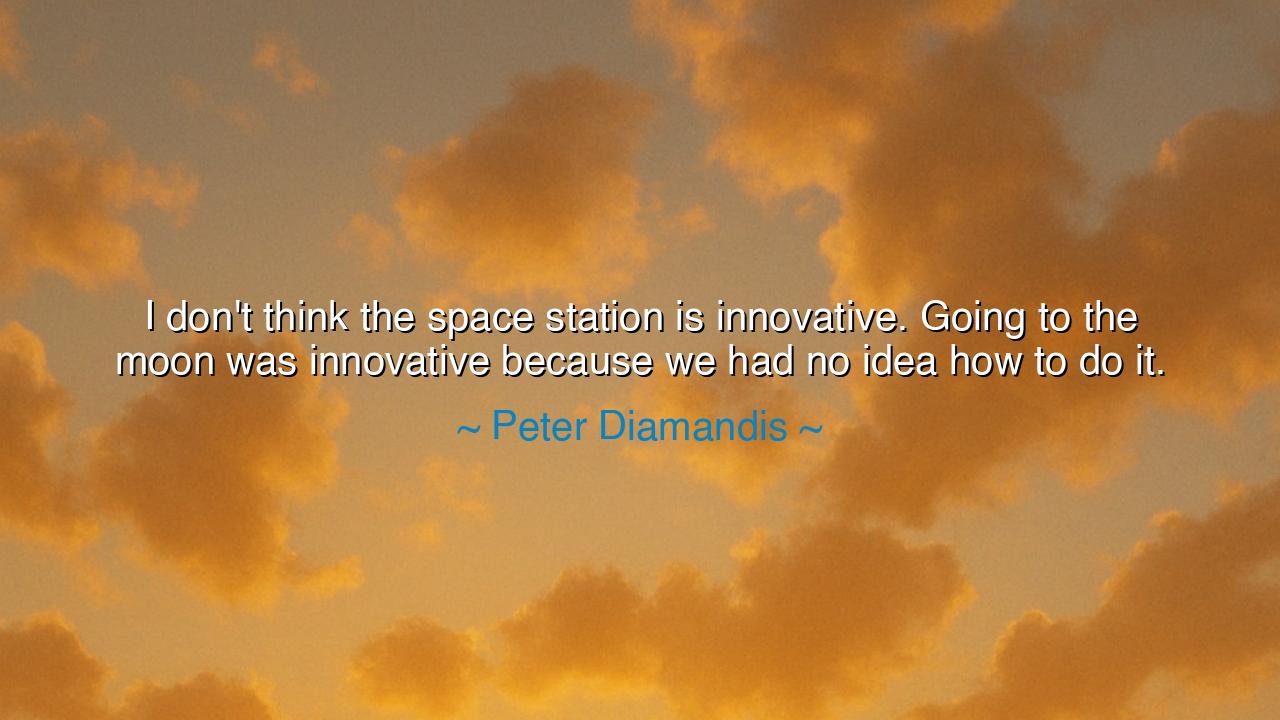
I don't think the space station is innovative. Going to the moon
I don't think the space station is innovative. Going to the moon was innovative because we had no idea how to do it.






"I don't think the space station is innovative. Going to the moon was innovative because we had no idea how to do it." These words, spoken by the visionary Peter Diamandis, speak to the very essence of innovation—the bold act of creating something new from the unimaginable. To understand this quote fully, one must recognize the immense gap between the known and the unknown. Diamandis is pointing out that the true spirit of innovation lies not in improving or extending existing ideas, but in venturing into unchartered territory, where the rules are yet to be written, where failure is as certain as success, and where the future of humanity is forged in the fire of the unknown.
In the ancient world, the pursuit of innovation was often tied to the quest for knowledge and discovery. The Greeks, with their philosophy of rational thought and the scientific method, were the early pioneers of such innovation. Figures like Archimedes and Pythagoras looked at the world around them and sought to understand the laws of nature, not through passive observation, but through active experimentation and exploration. They pushed the boundaries of thought and mathematics, not because they knew where their discoveries would lead, but because they dared to ask questions no one had asked before. This was the true spirit of innovation: to embrace the unknown and to move forward with courage, guided by a vision of what could be, rather than by a blueprint of what already existed.
The journey to the Moon in 1969, as Diamandis suggests, was the pinnacle of such bold innovation. It was a leap into the unimaginable. When John F. Kennedy announced the goal of sending a man to the Moon, humanity had no idea how to achieve it. There were no existing technologies, no guidelines, and no blueprints. The endeavor required ingenuity, creativity, and collaboration on a scale never before seen. The Apollo missions were not just about achieving the goal of landing on the Moon; they were about the audacity to attempt the impossible. They were about building the tools and the knowledge necessary to make the impossible a reality. In this sense, the Moon landing was not just a triumph of technology—it was a triumph of human spirit, a testament to our ability to innovate when faced with the unknown.
History is full of such moments of bold exploration, where humanity has moved beyond the boundaries of what was known, and in doing so, reshaped the world. Consider Christopher Columbus, whose voyage in 1492 to the New World was fraught with uncertainty and danger. The ships he sailed were not equipped for the challenges he faced. The maps were incomplete, and the destination was a mystery. Yet Columbus pressed forward, driven not by a guarantee of success, but by the unyielding belief that new worlds lay beyond the horizon. In his case, as with the Apollo mission, the journey was just as important as the destination—for it was through this boldness that new frontiers were opened for humanity, shaping the future of nations and civilizations.
Diamandis’ words draw attention to the difference between true innovation and the refinement of what has come before. The space station, while an incredible feat of human engineering, is not the same kind of leap as going to the Moon. It is an extension of what we already know about living and working in space. It is a building block in the larger effort to explore space, but it does not carry with it the same awe and mystery as the journey to the Moon, where humans had to build the future from the ground up, using imagination, resourcefulness, and hope. The innovation required for the Moon landing was not just technological; it was a mental leap into the realm of the impossible, a vision of what could be achieved if humanity dared to push beyond its limits.
The lesson in Diamandis’ statement is one of courage, vision, and creativity. True innovation comes not from improving what already exists, but from stepping into the unknown, from asking the questions no one has asked before and having the bravery to pursue answers without knowing where they may lead. In our own lives, we often face the temptation to seek the comfort of the familiar—to improve upon what is already in place rather than challenge the very structure that has been built. But as history shows, it is those who question the status quo, who dream of new worlds, who dare to step into the unknown, that shape the future. Innovation lies not in avoiding risk, but in embracing it, knowing that the greatest breakthroughs often arise from the most unexpected places.
In your own journey, take this lesson to heart: dare to be bold, to think beyond the boundaries of the known. Seek not just to improve upon what has been done, but to innovate, to create, to explore. Whether in your career, your relationships, or your personal growth, take the leap into the unknown, knowing that the rewards of true innovation are not in the ease of the journey, but in the strength and character built through the challenges faced. As the ancients understood, and as Diamandis reminds us, it is through the unknown, through the courage to innovate, that we create a future worthy of our highest aspirations.






AAdministratorAdministrator
Welcome, honored guests. Please leave a comment, we will respond soon